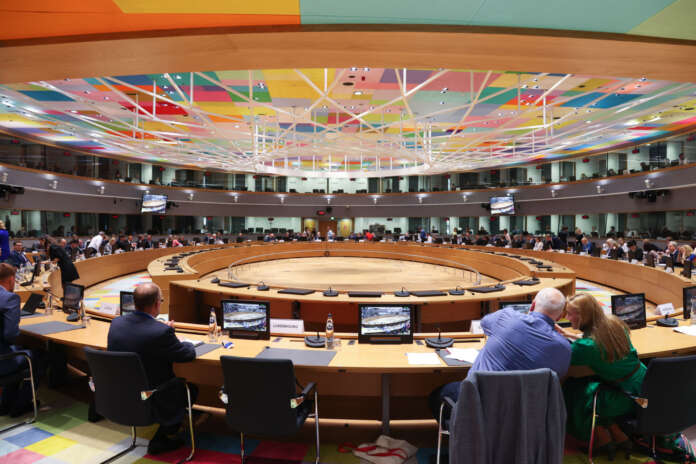In an effort to increase the security of energy supply, EU Member States reached a political agreement on a voluntary reduction of natural gas demand by 15 per cent this winter, during an extraordinary meeting of the Energy Council, convened by the Czech presidency following the request of the Commission last week.
The EU must reduce its gas demand preemptively
The purpose of the gas demand reduction is to make savings ahead of winter in order to prepare for possible disruptions of gas supplies from Russia, especially after the most recent announcement by energy giant Gazprom which is halting one more turbine at the Nord Stream 1 gas pipeline for maintenance, which in turn will bring the daily production capacity at the Russian Portovaya compressor station down to 33 million cubic metres (mcm) of gas per day from tomorrow, 27 July (its full capacity usually amounts to more than 160 mcm per day).
“In order to be prepared for a complete halt of gas supply we have to act now and tackle this crisis right now,” said Commission for Energy, Kadri Simson ahead of the meeting. “We will reduce our demand preemptively which will allow us to continue with the filling of our underground storage facilities.”
The plan, called Save Gas for a Safe Winter, was already presented by the Commission last week and by welcoming it, Member States agreed to reduce their gas demand by 15 per cent compared to their average consumption in the past five years, between 1 August 2022 and 31 March 2023, with measures of their own choice.
“Today’s decision has clearly shown the Member States will stand tall against any Russian attempt to divide the EU by using energy supplies as a weapon,” commented Jozef Síkela, Czech Minister of Industry and Trade. “Adopting the gas reduction proposal in record time has undoubtedly strengthened our common energy security. Saving gas now will improve preparedness. The winter will be much cheaper and easier for EU’s citizens and industry.”
The decision was also welcomed by several CEE ministers, including Slovenia’s Minister for Infrastructure Bojan Kumer, who underlined the importance of addressing the challenges together. And by Poland’s Minister of Climate and Environment Anna Moskwa who declared that the storage facilities of her country are full and Poland is ready for winter.
A fair and just gas reduction: all theexemptions and derogations taken into account by the Council
However, the Council is also taking into consideration that not all Member States have the same starting point, therefore it specified some exemptions and possibilities to request a derogation from the mandatory reduction target.
For example, countries that are not interconnected to other Member States’ gas networks are exempted from mandatory gas reductions as they would not be able to free up significant volumes of pipeline gas to the benefit of other member states. Or, States whose electricity grids are not synchronised with the European electricity system and are heavily reliant on gas for electricity production are also exempted, in order to avoid the risk of an electricity supply crisis.
Member States can also request a derogation to adapt their demand reduction obligations if they have limited interconnections to others and they can show that their interconnector export capacities or their domestic LNG infrastructure are used to re-direct gas to other States to the fullest. Finally, countries can also request a derogation if they have overshot their gas storage filling targets, if they are heavily dependent on gas as a feedstock for critical industries or if their gas consumption has increased by at least 8 per cent in the past year compared to the average of the past five years.
When choosing demand reduction measures, Member States agreed they should prioritise measures that do not affect protected customers such as households and essential services for the functioning of society like critical entities, healthcare and defence. Possible measures include reducing gas consumed in the electricity sector, measures to encourage fuel switch in industry, national awareness raising campaigns, targeted obligations to reduce heating and cooling and market-based measures such as auctioning between companies.
During the meeting, the Ministers also agreed to increase the role of the Council in triggering a Union alert activated by a Council implementing decision, acting on a proposal from the Commission. The Commission shall present such a proposal in case of a substantial risk of a severe gas shortage or an exceptionally high gas demand, or if five or more Member States that have declared an alert at the national level request the Commission to do so.



